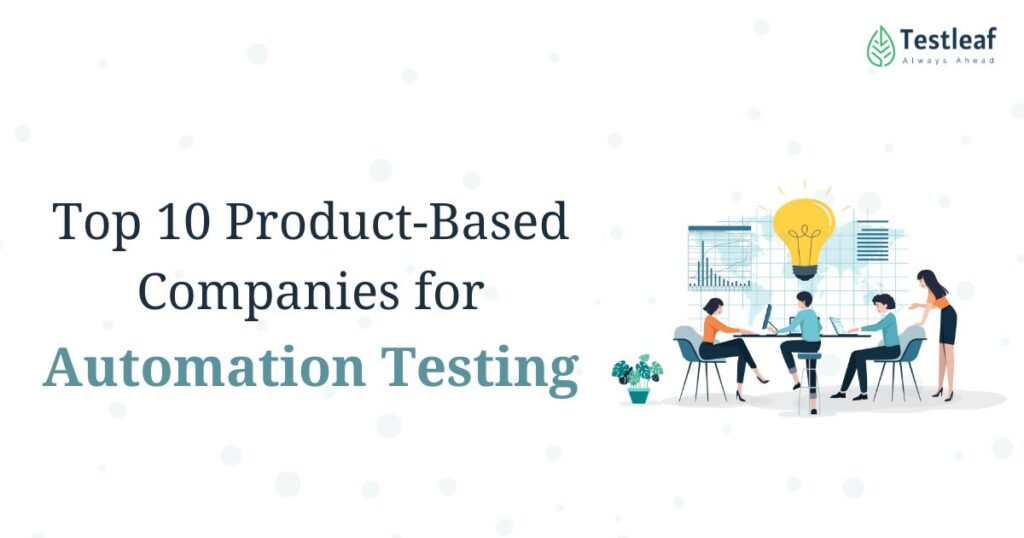Automation testing has become an essential aspect of the software development lifecycle. With the rise of agile methodologies and continuous integration, companies are increasingly relying on automation tools and frameworks to speed up testing cycles, reduce human error, and improve product quality.
For product-based companies, selenium automation testing is especially crucial because they rely on stable and scalable products to maintain a competitive edge.
In this article, we will explore the top 10 product-based companies that excel in automation testing.
1. Microsoft
Microsoft, one of the tech giants, has long been at the forefront of innovation in automation testing. The company offers a suite of tools for software developers and testers, including Azure DevOps, which integrates automation testing into the continuous integration/continuous delivery (CI/CD) pipeline. Microsoft has invested heavily in building robust testing frameworks, such as Selenium and Appium, to improve the efficiency and accuracy of its automated testing process. The company’s testing teams use a variety of tools to automate functional, regression, and performance testing for its vast range of software products, from Windows OS to Azure services.
Why Microsoft?
- Comprehensive testing ecosystem
- Integration with Azure DevOps and CI/CD pipelines
- Support for both web and mobile application testing
2. Google
Google is known for its cutting-edge technology and products, such as Google Search, Android, and Google Cloud. Google employs automation testing extensively to ensure its products are scalable, secure, and user-friendly. Google Test, an open-source testing framework, is one of the key tools used by the company’s engineers.
Additionally, Google heavily relies on tools like Selenium, Appium, and JUnit to automate testing across various platforms and devices. The company emphasizes continuous integration, ensuring automated tests run with each code change.
Why Google?
- Use of open-source testing tools
- Strong focus on scalability and performance testing
- Integration of automated tests within CI pipelines
3. Amazon
Amazon, the leader in e-commerce and cloud computing, places a strong emphasis on automation testing to ensure the quality of its vast product offerings, including AWS and its e-commerce platform. The company uses tools like Selenium, JUnit, and TestNG for functional and regression testing.
Amazon also leverages AWS Device Farm, which allows for testing mobile apps across real devices on the cloud. This approach reduces the need for physical device management and speeds up the testing process, making it a favorite among product-based companies.
Why Amazon?
- Strong integration with AWS for testing in the cloud
- Scalable mobile and web testing solutions
- Use of cutting-edge automation testing tools like Selenium
4. Atlassian
Atlassian is renowned for its suite of software tools designed for collaboration and project management, including Jira, Confluence, and Bitbucket. To ensure their products are of the highest quality, Atlassian uses Selenium and Appium for automation testing across web and mobile applications.
Additionally, the company employs Cucumber for behavior-driven development (BDD) testing, ensuring the product meets the end-user requirements. Atlassian also integrates its testing tools with Jenkins for automated builds and testing.
Why Atlassian?
- Use of BDD with Cucumber
- Integration with Jira for test management
- Cross-platform testing for web and mobile applications
5. Oracle
Oracle is a leading enterprise software company known for its database solutions and cloud computing products. Oracle uses automation testing extensively to ensure the performance and scalability of its enterprise products. Tools like Selenium, JUnit, and TestNG are utilized for functional, regression, and performance testing. Additionally, Oracle leverages its Oracle Cloud platform for automating testing across multiple environments and devices, ensuring seamless execution of automated tests.
Why Oracle?
- Focus on testing enterprise-level applications
- Cloud-based automation for scalability
- Comprehensive use of test automation tools
6. IBM
IBM, a global leader in technology solutions, has embraced automation testing across its diverse product portfolio, including IBM Watson and IBM Cloud. The company employs a range of testing frameworks, such as Selenium, JUnit, and Appium, to automate functional, regression, and load testing.
IBM integrates its automation testing efforts within its DevOps pipeline using tools like Jenkins and UrbanCode, ensuring continuous testing during the software development lifecycle.
Why IBM?
- Robust DevOps and CI/CD integration
- Advanced testing for AI and cloud-based products
- Use of both open-source and enterprise-grade testing tools
7. Salesforce
Salesforce, the global leader in customer relationship management (CRM) software, leverages automation testing to maintain the high quality and scalability of its cloud-based solutions. The company uses tools like Selenium, JUnit, and Appium for automated testing across its Salesforce platform.
Salesforce’s automation testing strategy also includes using tools like QUnit for unit testing and Jenkins for continuous integration to ensure automated tests run with each code update.
Why Salesforce?
- Strong emphasis on cloud-based testing
- Integration with Salesforce-specific testing tools
- Continuous integration with Jenkins
8. Adobe
Adobe, a leader in creative software products like Photoshop, Illustrator, and Acrobat, uses automation testing to ensure its products work seamlessly across different platforms. The company uses Selenium, JUnit, and TestNG to automate functional and regression tests for its desktop and mobile applications. Adobe also embraces automation for performance testing, particularly for large-scale applications like Adobe Creative Cloud and Adobe Document Cloud.
Why Adobe?
- Focus on testing for creative and design tools
- Integration with CI/CD pipelines
- Strong automation for performance and security testing
9. Red Hat
Red Hat, a leading provider of open-source solutions, uses automation testing to ensure the quality and reliability of its enterprise products, including Red Hat Enterprise Linux and OpenShift.
The company relies on tools like Selenium, JUnit, and Robot Framework for automating functional, integration, and regression tests. Red Hat also integrates its automated testing processes with Jenkins and Ansible to ensure continuous delivery of high-quality software.
Why Red Hat?
- Strong focus on open-source testing tools
- Integration with CI/CD tools like Jenkins and Ansible
- Scalable testing for enterprise products
10. SAP
SAP, a global leader in enterprise resource planning (ERP) software, relies heavily on automation testing to maintain the quality of its enterprise software suite. SAP uses a combination of open-source tools like Selenium, JUnit, and TestNG along with its internal testing framework to automate functional, regression, and integration tests. The company also emphasizes testing within its cloud environments to ensure its products perform well at scale.
Why SAP?
- Extensive testing for enterprise-level ERP solutions
- Integration of automated tests in cloud-based applications
- Use of both open-source and proprietary tools for automation
Conclusion
Automation testing is crucial for product-based companies to maintain the efficiency, scalability, and reliability of their software. From tech giants like Microsoft and Google to enterprise solutions from Oracle and SAP, these companies are leading the way in automation testing.
By utilizing a combination of open-source tools, custom frameworks, and CI/CD pipelines, they ensure that their products are of the highest quality, meeting both customer expectations and performance standards.
Whether you’re a developer or a QA engineer, adopting the best practices from these top companies can help streamline your automation testing efforts and improve your overall product quality.
Elevate your QA workflow by referencing A QA Engineer’s Guide to Collaborating Better with Developers for best practices.
We Also Provide Training In:
- Advanced Selenium Training
- Playwright Training
- Gen AI Training
- AWS Training
- REST API Training
- Full Stack Training
- Appium Training
- DevOps Training
- JMeter Performance Training
Author’s Bio:

As CEO of TestLeaf, I’m dedicated to transforming software testing by empowering individuals with real-world skills and advanced technology. With 24+ years in software engineering, I lead our mission to shape local talent into global software professionals. Join us in redefining the future of test engineering and making a lasting impact in the tech world.
Babu Manickam
CEO – Testleaf








